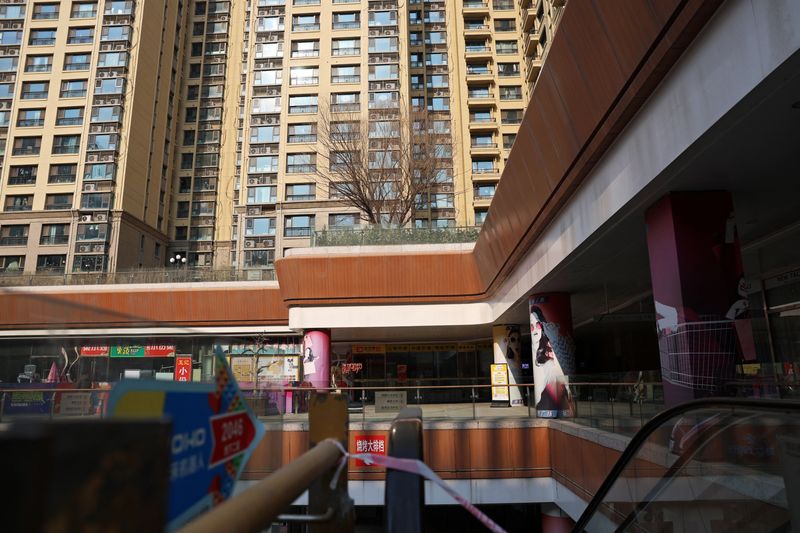By Laura Matthews and Tom Westbrook
NEW YORK/SINGAPORE (Reuters) - A liquidation order for China's most debt-laden developer begins a drawn-out process for creditors that is likely to lay bare the depths of China's real-estate downturn and leave builders locked out of global debt markets as investors shun exposure.
A Hong Kong court appointed liquidators for China Evergrande (HK:3333) on Monday, more than two years after its default brought a years-long property boom to a shuddering halt.
It has assets of $240 billion and is the world's most indebted developer with nearly $300 billion in liabilities. Markets expect foreign bondholders to be the biggest losers and owners of unfinished apartments to be prioritised.
The restructure or sale also holds broader significance for debt and real estate and for investor confidence as it unfolds against a backdrop of sliding home prices and economic malaise that's sent equity markets spiralling down to multi-year lows.
Evergrande debts trade below two cents on the dollar and its shares hit a record low on Monday before being suspended.
By Tuesday a recent bounce in developer stocks was in reverse and yuan notes in China Vanke, the country's No. 2 developer by sales, slipped a little to 79 yuan. "Investors in this part of the market at this point are likely speculating as to who comes out of this relatively less damaged and which bonds are going to have better recovery rates," said Phil Wool, a co-portfolio manager of Rayliant's Quantamental China ETF. "The fact that we're getting such a momentous headline and there's not a huge negative response in the market tells you how much negativity is baked into prices." A positive surprise, he said, would be authorities in China acknowledging and assisting in executing the Hong Kong court order, though that is unclear.Rock-bottom confidence is meanwhile on display in primary markets too, which were once dominated by developers.
Total U.S. dollar issuance for China collapsed to $42.5 billion last year from pre-pandemic levels above $200 billion, data from Dealogic showed and while resolving Evergrande's debts could help, investors expect that to be a slow process.
"If the process is resolved in a fair and equitable manner for creditors it should help restore Chinese firms' access to markets," said Kamil Dimmich, partner and portfolio manager at North of South Capital emerging markets' fund.
"More broadly unfinished properties may now be sold (or) assigned to developers with capacity to complete them and allow for deliveries to clients. This could over time help restore some confidence for homebuyers and remove a huge overhang."
CONFIDENCE CRISIS
Weakness in the property market, stemming from the collapse of Evergrande and others, has been the major headwind for China's growth and the confidence of consumers and investors.
The Hang Seng index of mainland developers stumbled to a record low last week and analysts expect a drumbeat of asset sales and restructures to keep the pressure on. (HK) "Evergrande's winding-up order may accelerate the negotiation process of other developers’ dollar debt restructuring," said John Lam, head of China and Hong Kong Property Research at UBS in a note to clients. "Since the dollar restructuring programs announced so far have involved debt-to-equity options, this implies ... substantial equity dilution, a negative to equity price(s) for those defaulted developers."
Dollar bonds in the sector are priced for investor returns to be low. Debts due in 2027 for Sunac China, which had a restructuring proposal approved in October, trade at 11 cents on the dollar. Defaulted debts of Country Garden, which is selling offshore assets, trade around 8.5 cents
To be sure, global markets have moved on from fears of a credit crunch or systemic wipeout that ripples around the world.
"The liabilities are being distributed in a million different ways throughout the Chinese financial system," said Leland Miller, chief executive of investor-focused analytics firm China Beige Book.
"China has a non-commercial financial system, which means it's not going to have a Lehman moment," he said.
Still, even if Evergrande is dismantled carefully a lot of damage has been done and most investors do not want to touch the real estate sector, which once accounted for nearly a quarter of economic output, or indeed China until it is properly repaired.

"The main issue they still face is consumer confidence is not there as long as they don't really know what's going to happen with these unsold homes," said Thomas Rupf, chief investment officer for Asia and head of trading at VP Bank.
"The uncertainty for every consumer - you want the house you bought to be finished before you move on to recover."